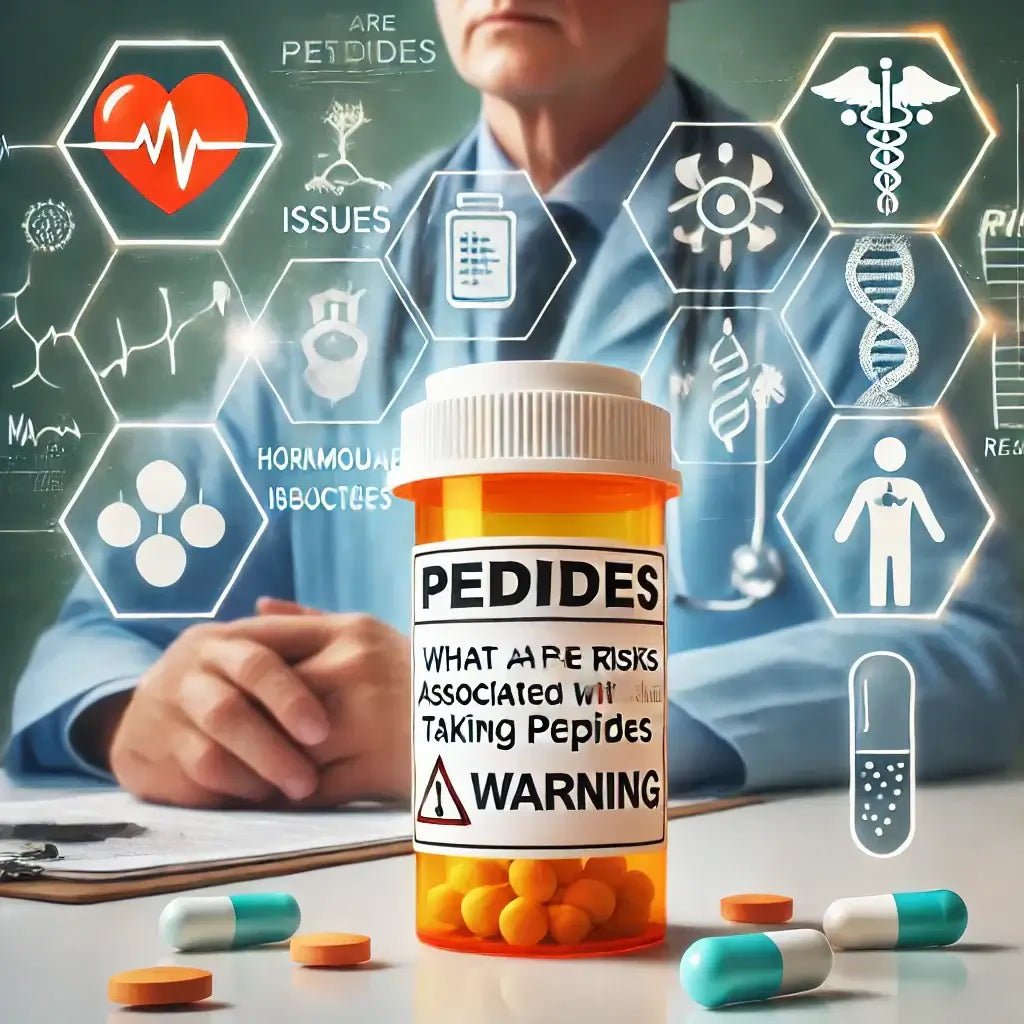What Are the Risks Associated with Taking Peptides? A Detailed Guide

What Are the Risks Associated with Taking Peptides? A Complete Guide
Understanding Peptides and Amino Acids
Peptides are short chains of amino acids, which are the building blocks of proteins that support various bodily functions. These molecules play a crucial role in muscle growth, fat loss, tissue repair, immune system regulation, and skin health.
Peptides can either be naturally produced by the human body or synthesized in a laboratory for use in therapeutic peptides designed to treat specific medical conditions. Peptide therapy involves using specific peptides to target conditions such as diabetes mellitus, autoimmune disorders, severe chronic pain, and hormonal imbalances.
These peptides are commonly used in drug development and medical treatments, but more research is needed to fully understand their long-term effects.
💡 While peptide therapy offers potential benefits, there are also significant risks that users should be aware of before starting treatment. Without proper medical supervision, peptide use can lead to serious health concerns, including immune system reactions, cardiovascular issues, and hormonal imbalances.
What Are Peptides?
Peptides are composed of short sequences of amino acids, usually ranging from 2 to 50, that are connected by peptide bonds. These molecules act as the building blocks of proteins, which are essential for maintaining various biological processes in the human body, including metabolism, tissue repair, immune response, and muscle growth.
Peptides can either be naturally produced within the body or synthesized in a laboratory for medical, therapeutic, and research purposes. These molecules serve a wide range of functions, acting as hormones, neurotransmitters, and cell signaling agents, helping to regulate:
✅ Metabolism – Certain peptides influence how the body processes nutrients, burns fat, and builds muscle mass.
✅ Immune System Function – Some therapeutic peptides help modulate the immune response, reducing inflammation and autoimmune reactions.
✅ Tissue Repair & Wound Healing – Certain peptides promote cell regeneration, making them useful in treating injuries and improving skin health.
✅ Muscle Growth & Recovery – Growth hormone-releasing peptides (GHRPs) stimulate the release of human growth hormone (HGH), which is crucial for muscle development, fat metabolism, and recovery.
Medical Uses of Peptides
Therapeutic peptides have been developed for medical conditions ranging from hormonal imbalances to tissue repair. Some of the most well-known peptide drugs include:
Human growth hormone (HGH) – Used for growth disorders and anti-aging purposes.
Gonadotropin-releasing hormone (GnRH) – Helps regulate fertility and reproductive health.
Insulin – A peptide essential for diabetes mellitus treatment.
Semaglutide (Ozempic, Wegovy) – A glucagon-like peptide 1 (GLP-1) drug used for diabetes and weight loss.
💡 Whil specific peptides ine these FDA-approved therapeutic agents are regulated for safety, certain peptides used for performance benefits and anti-aging may carry greater potential dangers due to their unregulated status.
Risks of Peptide Use
While peptides can offer performance benefits, improved skin elasticity, and enhanced muscle growth, they also come with potential risks, especially when used without medical supervision.
🚨 Risks of Peptide Use Include:
Hormonal imbalances – Some growth hormone secretagogues can disrupt the body's ability to regulate growth hormone levels properly.
Immune system reactions – The body may recognize synthetic peptides as foreign substances, leading to allergic reactions or autoimmune disorders.
Fluid retention and water retention – Some peptides can increase water retention, which may affect body composition and overall health.
Cardiovascular problems – High blood pressure and cardiovascular issues may arise from excessive use of certain peptides.
Injection site reactions – Users may experience pain, swelling, or irritation at the injection site.
📌 If you're considering peptide therapy, always consult a healthcare provider to minimize potential dangers and avoid serious health concerns.
Short-Term Effects of Peptide Use
The short-term effects of peptide use can vary depending on the type of peptide, dosage, and individual factors. Some common short-term effects of peptide use include:
Increased muscle growth and strength
Improved athletic performance and endurance
Enhanced fat loss and weight management
Improved skin health and appearance
Increased energy and vitality
Improved immune system function
However, some peptides can also cause short-term side effects, such as:
Allergic reactions
Injection site reactions
Hormonal imbalances
Interactions with other medications
Unknown long-term effects
Long-Term Consequences of Peptide Use
The long-term consequences of the peptide drug use are not yet fully understood and may vary depending on the type of peptide, dosage, and individual factors. Some potential long-term consequences of peptide use include:
Hormonal imbalances and disruptions to the body’s natural hormonal balance
Increased risk of certain diseases, such as cancer and autoimmune disorders
Unknown effects on the immune system and overall health
Potential for addiction and dependence
Interactions with other medications and substances
It is essential to consult with a healthcare professional before using peptides to discuss the potential risks and benefits and to determine the best course of treatment.
Synthetic Peptides: Unique Risks and Allergic Reactions
Synthetic peptides, particularly growth hormone releasing peptides (GHRPs) and growth hormone secretagogues, are commonly used to boost muscle growth, enhance fat loss, and improve physical performance. However, these peptides can have unique risks due to their ability to alter human growth hormone' production.
🚨 Potential Risks of Synthetic Peptides Include:
Increased appetite and changes in body composition – Due to the stimulation of growth factors.
Blood pressure fluctuations – Some peptides may cause high blood pressure or fluid retention.
Potential long-term effects on metabolic health – More research is needed to understand their impact on overall health.
📌 Because the long-term effects of synthetic peptides remain unclear, their use should be approached with extreme caution.
Signs and Symptoms of Peptide Abuse
Identifying peptide misuse or abuse early is crucial for preventing serious health complications.
🔍 Physical Signs of Peptide Abuse:
Unexplained changes in body composition – Rapid muscle growth or fat loss.
Persistent fatigue, swelling, or fluid retention.
Severe headaches, dizziness, or high blood pressure.
🔍 Behavioral & Psychological Signs of Peptide Abuse:
Obsessive focus on body image and athletic performance.
Psychological dependence on peptide therapy.
Irritability, mood swings, or changes in sleep patterns.
📌 If you or someone you know is experiencing these symptoms, seek professional help immediately.
Peptide Use in Bodybuilding, Growth Hormone, and Weight Loss
Many peptides are short chains of amino acids that help in muscle growth, fat loss, and recovery. However, peptide therapy for bodybuilding or rapid weight and body fat loss carries serious risks.
🚨 Dangers of Peptide Misuse in Bodybuilding Include:
Unregulated sourcing – Many peptides sold online may contain harmful active ingredients.
Increased risk of cardiovascular disease – Excessive use of growth hormone can contribute to heart disease and heart attacks.
Potential for withdrawal symptoms – Peptide misuse can lead to dependency and negative health effects.
📌 Despite their appeal certain peptidess used in bodybuilding are banned in professional sports due to their performance-enhancing effects.
Seeking Help and Treatment for Peptide Misuse
If you or someone you know is struggling with peptide misuse, it’s important to recognize the problem early and seek professional help before it leads to serious health concerns. Misusing growth hormone-releasing peptides, performance-enhancing peptides, or other synthetic peptides can cause hormonal imbalances, cardiovascular issues, immune system reactions, and psychological dependence.
💡 Peptide misuse isn’t just about physical side effects—it can also impact mental health, body composition, and long-term well-being.
👨⚕️ Steps to Take for Peptide Misuse Recovery
✔️ Consult a Healthcare Professional – A doctor, endocrinologist, or addiction specialist can assess potential risks, withdrawal symptoms, and long-term effects associated with peptide misuse. They can also guide you toward safer treatment options.
✔️ Consider Lifestyle Changes – Instead of relying on peptides for muscle growth, fat loss, or athletic performance, focus on proper nutrition, strength training, behavioral modifications, and recovery strategies to maintain physical performance and well-being naturally.
✔️ Explore Alternative Medications – There are FDA-approved treatments that can help with hormonal imbalances, body composition regulation, and tissue repair without the potential dangers of unregulated peptides.
📌 Prevention and education are key. Understanding the risks of peptide misuse can help individuals make informed decisions and avoid long-term health consequences. Seeking help from a healthcare provider is the first step toward recovery and maintaining overall health.
Conclusion
While peptide therapy has potential benefits, its significant risks should not be ignored.
📌 Key Takeaways:
✅ Some peptides are FDA-approved and used for treating medical conditions like diabetes mellitus, cardiovascular disease, and tissue repair.
✅ Synthetic peptides can lead to serious health risks, including immune system reactions, hormonal imbalances, and cardiovascular problems.
✅ Seeking professional medical guidance is crucial before using peptides for weight loss, muscle mass, or anti-aging.
💡 If considering peptide therapy, always consult with a licensed healthcare provider. Buying from unverified sources increases the risk of dangerous side effects.
🚨 Buying peptides from Peptide Hackers is much cheaper than prescription peptides, but we do not sell peptides for human use—only for research purposes.
📌 You mental health alwaysh is your priority—always make informed choices when considering peptide therapy!


